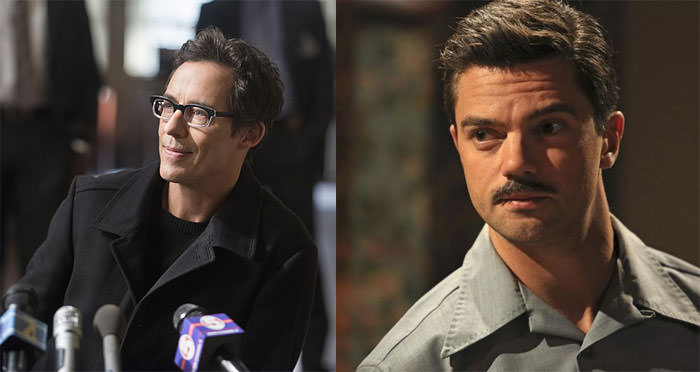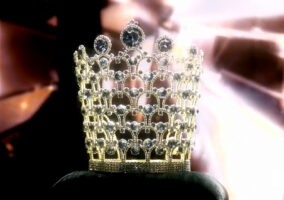Tom Cavanagh in The CW’s “The Flash” and Dominic Cooper in ABC’s “Agent Carter.”
The Flash: “The Sound and the Fury”/Marvel’s Agent Carter: “The Blitzkrieg Button”
It was a night of place-setting for our nascent superheroes, as one hero’s mentor is revealed to be more complicated than we realized while another’s mentor is revealed to be a little less trustworthy than we’d assumed. Harrison Wells and Howard Stark may not be all that similar to each other (except for the whole “morally vague genius who creates superheroes” thing, which we admit is a considerable trait to share with someone), but in both cases, their genius and their shaky morality are defining and shaping these heroes against their wills. They’re at different points in their realization, but ultimately both heroes are going to be asking the same question before long: When does a mentor become a liability?
In The Flash, the question goes quite a bit further, even if Barry is almost completely in the dark about it. Right now, the question is for us to pose, as we’re being painted a picture of Harrison Wells that’s designed to deliberately confuse the viewer; he’s a wonderful and even thoughtful mentor but he’s also the man who killed Barry’s mother and threatened Iris. Allegedly. He’s not just a potential liability as a mentor, there’s every indication that he’s downright dangerously evil. But it occurred to us last night that if the writing wasn’t as tight as it is and Tom Cavanagh’s performance wasn’t as confident as it is, we’d probably be gnashing our teeth in frustration over this maddeningly contradictory character. It stands to reason that whatever we think we know about him is only part of the story. We got to see him use his red-lightning’d super-speed out of costume, confirming that he is, in fact, the man behind the yellow mask. But it doesn’t necessarily follow from that that he’s the same man in the yellow mask who killed Barry’s mother. Or even that Barry’s mother was killed by the man in the yellow mask at all. Plus there’s the whole time travel thing, which could very well mean that whoever was in that yellow mask in the Allen family living room 20 years ago might not have made that journey yet on their own timeline. For all we know, Barry is the one who winds up in the yellow suit in the Allen living room that night. Our only wish for this storyline is that too much of it isn’t left dangling or unanswered by the end of this season. It’s an intriguing long-term arc, but it’ll only sustain interest by delivering more information and unfolding somewhat naturally.
In other news, congratulations are in order for Barry, who got his first super-bitchy gay villain. The Pied Piper has a dumb name and an even dumber costume (letting down your fellow gays there, son), but you can’t deny he has panache and a way with a cutting remark. Like almost everyone Barry’s faced, he’s likely to be a problem again very soon, but such is the nature of comic book storytelling – and especially in the case of The Flash’s rogues, who are defined pretty much by their tenacity.
Iris is back to being an irritatingly poorly written character – the only one in the show, in fact. Were we supposed to feel bad for her that she wasn’t allowed to pitch hard-hitting stories on her first day on the job? Honey, sit down. And then she’s given this moment during the press conference that’s played like it’s some sort of triumph, when in fact she was only called on because the guy knew her father and she wound up repeating a question someone else asked. Not exactly the snap-worthy moment she tried to play it as. In fact, getting a little attitudinal in that moment only made her look more entitled and juvenile. We want to like her, if for no other reason than she ‘s not likely to be going anywhere soon, but it’s amazing how tone deaf the writing is for her.
And the father-bonding moments between Barry and Joe are reaching self-parody levels at this point. Sure, it’s touching, but this time around, Barry’s “You were a good father to me” speech seemed to come out of left field – and it’s already been said a couple of times now, which made it seem redundant to boot. We can understand the thematic resonance; Barry has a lot of fathers in this story and Harrison is one of them, but we don’t necessarily need to see that kind of speech-making every week. In a show that brings a charmingly low-key naturalism to fantastical stories, that type of scene sounds less natural each time it’s presented. Still, it played well with the revelation at the end that Joe is going behind Barry’s back and investigating Wells. The potential for high drama in this storyline just kicked into high gear. One or more of Barry’s fathers is going to betray him before this is all over.
Agent Carter has a much more evolved relationship with her own mentor figure, Howard Stark. It may not even be entirely accurate to call him her mentor, but she is working for him, begrudgingly learning from him, and relies on him for pretty much all of her “super powers,” the many fantastic spy gadgets at her disposal. But Peggy Carter knows herself and knows Howard Stark (or at least she does by the end of this episode), which means that, unlike Barry Allen, she can forcefully call him out when he disappoints or angers her.
This was the first real place-setting episode (we have got to come up with a more distinctive term than that one, which has reached critical cliche mass among TV reviewers) of this mini-series and while we enjoyed every minute (some more than others), it was easily the least satisfying so far. For one, there were far too few scenes of Peggy kicking ass and being spectacular. This may have been by design in order to make us feel the weight of being reduced to the girl who picks up lunch for the men. Even Howard, one of only 2 people who know – and relies upon – how amazing she is, was barking food orders at her at one point. But there was also a distinct lack of subtlety in the writing this time around, to the point that we could practically hear the hammer coming down each time.
Howard can’t just be a womanizer, we have to see him shuffled out of every room on Peggy’s floor like he’s in a screwball comedy from the thirties, even though the risk of being caught is very high, and would result in his arrest and probably Peggy’s.
Jarvis can’t just have a nervous twitch when he lies; it has to be so obvious that it wasn’t until the end of the episode that we realized it was a twitch at all and not a deliberate signal. Seriously, who nervously pulls on their ear that hard and that obviously?
Peggy doesn’t just work with typically sexist men of the period, they have to actually say things like “You know you’re inferior because you’re a woman, right?” Maybe we’re asking too much and maybe we’re used to the brilliantly subtle ways a show like Mad Men depicted the sexism of the day, but that scene in particular sounded like really bad comic book dialogue being read out loud. This show has done such a wonderful job of depicting the backbreaking sexism of the day without being too on-the-nose about it, so we really hope that scene was an outlier and we don’t get too much more of that. Similarly, Howard’s little speech about being an outsider struck us as a bit too much of a thematic statement than a real sentiment, but we appreciate that the show is so committed to this one theme.
But to be fair, the writing also managed to flesh out Peggy’s co-workers just a little bit better, showing all of them to be committed to – and good at – their jobs in different ways, even as it makes no bones about how unevolved or downright jerkish they can be in other ways. That’s a subtlety we can appreciate and respect because it makes their chauvinism that much more disappointing when it rears its head. You never lose sight of the idea that, under only slightly different circumstances, Peggy and her male co-workers would respect and support the hell out of each other. That’s what gives the show a poignancy we weren’t expecting and continues to elevate it above other adventure shows.
2015 People’s Choice Awards Red Carpet Rundown, Part 1 Next Post:
Mad Men Season 7.5 Promo Pictures
Please review our Community Guidelines before posting a comment. Thank you!




